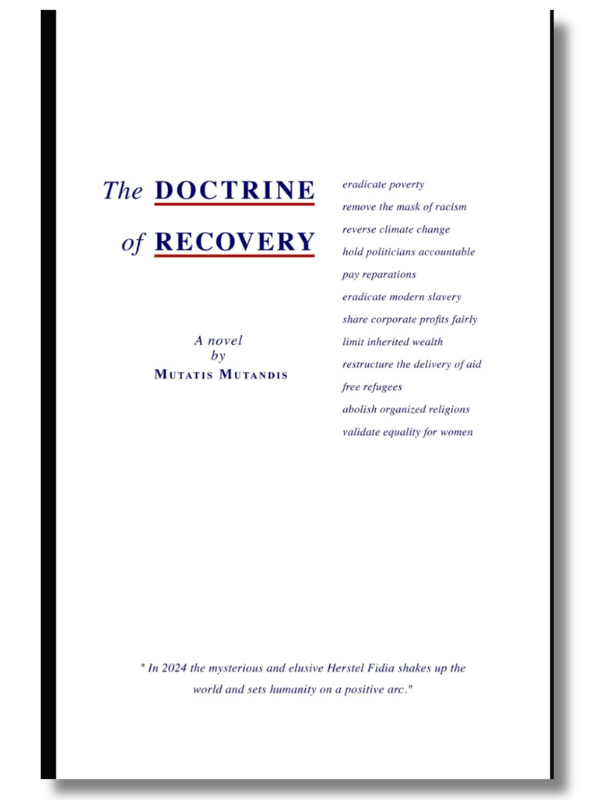The Doctrine of Recovery
by Mutatis Mudandas
Genre: Literary Fiction
ISBN: 9798878228213
Print Length: 190 pages
Reviewed by Nikolas Mavreas
A work speaking powerfully against injustice
The Doctrine of Recovery, written under the pen name Mutatis Mutandis, is a novel functioning as a manifesto or a manifesto in the guise of a novel. It invites the reader to imagine and strive for a better society, in which the evils that currently torture the world are no more and where it is all for one and one for all.
The novel is introduced by a scene in a utopian world in the year 2101, with an old man trying to explain to his grandchild how the present state of things came to be. We are transferred back to early 2024, to the time a mysterious man named Herstel Fidia, seemingly hailing from Madagascar, appears. Fidia is a secular figure of the prophet-messiah archetype, preaching against injustices and for worldwide reform.
As Herstel is delivering his message in TV interviews and in front of the United Nations General Assembly, there is a series of attacks against undemocratic world leaders. An organized plan seems to be underway and it is slowly revealed that a silent revolution is supported by an online platform called Mighty Blue, which functions not just as a resource but as a brain which points participants toward their most suitable purpose.
Chapters switch between Herstel’s proselytizing and world events. His inspiring speeches are given in self-contained chapters fittingly reminiscent of Thus Spake Zarathustra, giving the book an energizing, scream-it-from-the-mountaintop vitality. Interspersed throughout are coffeeshop discussions between two normal, everyday witnesses of these events whose down-to-earth commentary balances effectively with the high-mindedness of Herstel Fidia.
There is not much characterization given to the prophet protagonist, which does add to his aura of someone who is here for a purpose. Following a satisfying and surprising ending, the artifice of the novel is dropped—for the last 40 pages, a factual and numerical survey of the world economy and its scandals takes its place.
The book’s title is an incisive play on the 1493 Doctrine of Discovery which decreed that all lands were up for grabs by Christians. The Doctrine of Recovery, through its protagonist, argues for social justice, environmental conservation and the redistribution of wealth. Despite the novel’s conceit existing on the verge of science fiction, its message is transcendent and realistic: it is up to everyone to contribute in a small but steady way, on a path parallel to their lives, as the author beautifully puts it.
The Doctrine of Recovery is a story sitting a hair’s width away from reality, and as such has the imploring potency of some of the best fiction. It is an urgent and compelling case for change.
Thank you for reading Nikolas Mavreas’s book review of The Doctrine of Recovery by Mutatis Mudandas! If you liked what you read, please spend some more time with us at the links below.
The post Book Review: The Doctrine of Recovery appeared first on Independent Book Review.
